Albany’s latest plot to screw gig workers — and the public

More On:
gig economy
Like Uber, Lyft, ride-sharing app Via accused of mistreating drivers
Uber, Lyft shares soar as ride-hailing apps avert California shutdown
Uber says new driver ruling would force it to shut down in California
There’s a cook for that: Apps providing needed income for chefs
Labor bosses and New York pols beholden to them are conspiring to screw gig workers and the public with legislation that would skirt antitrust laws and let app-based contractors unionize.
The union chiefs want to pump up their membership rolls and dues revenue, preferably by forcing deliverymen and drivers for companies like Uber and Lyft to be considered employees rather than independent contractors. But the labor bosses are willing to compromise (for now) if workers can be unionized without counting as employees.
John Samuelsen, president of the Transport Workers Union, openly gushes that the bill would “add tens of thousands of members into the organized labor movement.” Meanwhile, unions can still hope Washington restricts independent contracting nationally, as President Joe Biden and fellow Democrats hope to do with their PRO Act.
The big app-based companies, for their part, see the collective-bargaining bill as better than legislation that would force contractors to be employees, a shift that would wreck their business models. And power players like Uber and Lyft won’t mourn if the bill also drives their smaller competitors (less well-positioned to deal with unions) out of business.
Yet contractors may lose ground: They don’t get the benefit of becoming employees yet can be forced into a union and so have to pay dues. Only 10 percent would be needed to OK a union, and they’d be denied secret ballots when they voted. In fair elections, workers have been nixing unions, as those at an Amazon warehouse in Alabama recently did — because they’re happy to work out their own terms with employers.
That’s particularly true for gig workers, who enjoy the flexibility of being independent. Plus, costly union terms could lead companies to hire fewer workers.
Workers would also be subject to other restrictions: They couldn’t strike, for example. Which is why some groups, like Los Deliveristas Unidos and service workers’ union 32BJ SEIU, oppose the bill, which prompted even Samuelsen and the TWU to walk back their initial support for the current version.
Nor would the public be served. The costs of union-dictated rules and pay rates are ultimately passed on to consumers. Plans even call for consumers to pay unions a “representation fee”: 10 cents per ride. Oh, and the bill would also flout antitrust laws by making negotiated deals subject to state approval.
Forcing companies to reclassify independent contractors as employees proved such a disaster in California that even the state’s heavily Democratic voters killed the idea last year. Yet the Frankenstein version being planned in Albany could be even worse.
Share this article:
Source: Read Full Article
